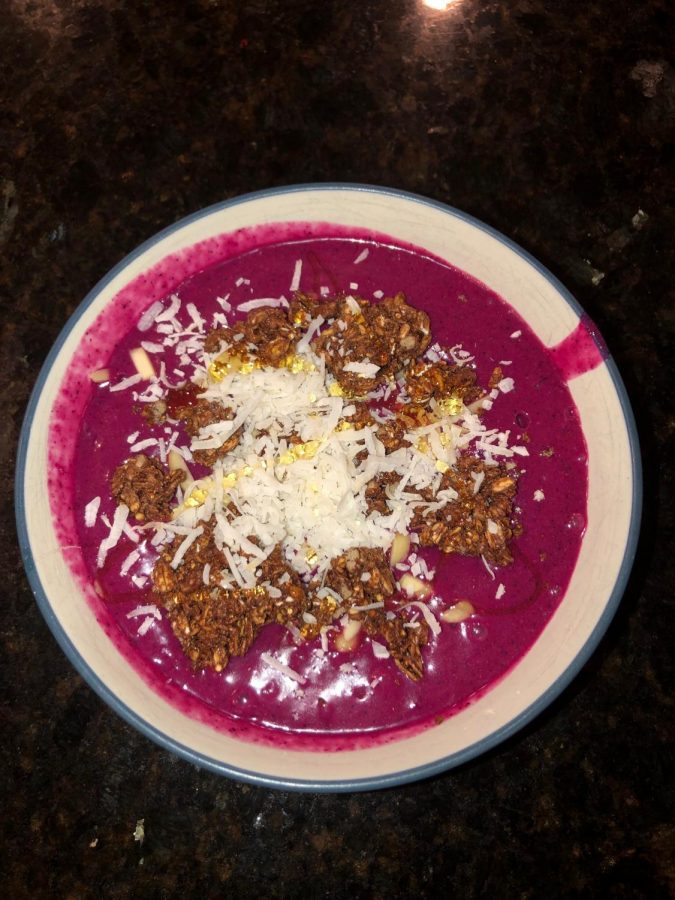Why you should consider going Vegan
An acai bowl, a thick smoothy topped with fruits or other natural food items, is pictured above.
With new research about the alarming irreversible environmental crisis being published daily, individuals within the past few months have searched for alternatives to help lessen their carbon footprint and to minimize their overall waste.
While students have brainstormed and encouraged bringing reusable water bottles everywhere, doing the laundry less or recycling more to reduce waste and save water, we have neglected a critical issue: the detrimental effects of the meat industry on the environment, and the simple alternative to help reduce water usage and save animals, which can be solved by going vegan.
Yes, it seems extreme. Adhering to a plant-based diet and not consuming any animal products such as meat, milk or honey seems excessive, restrictive, or even malnourishing. But, in reality, if done correctly (ensuring that you have an adequate intake of protein and other nutrients), veganism is incredibly beneficial to the environment and to our health.
According to People for the Ethical Treatment of Animals organization, it takes more than 2,400 gallons of water to produce one pound of meat, while it takes 25 gallons of water to grow one pound of wheat; the difference in the two is groundbreaking. Similarly, according to “The Hidden Costs of Hamburgers” video published by Reveal on Youtube, given that cows are ruminants, they produce methane gas when digesting food, which contributes to the overall threat of climate change.
Due to the aforementioned facts and the growing awareness about the environmental crisis, my friends and I sought change; we wanted to raise awareness about the effects of the meat industry has on the environment, and the hidden effects it has on our livelihoods.
Over the week of October 22-28, sophomores Ariella Ball, Mischa Trainor and I sought to participate in “A Week of Veganism” to raise awareness about the detrimental effects the meat industry has on the environment and to promote the simplicity of a vegan lifestyle. To do so, we decided to reduce the “restrictive” stigma surrounding veganism by informing each other about various healthy protein supplements and more for a BBYO program about environmental consciousness.
Throughout the week, the three of us supplemented skim milk for almond milk, ate plant-based protein, tofu or beans instead of eating meat each night and explored new recipes from websites like Cookie and Kate which offers healthy various alternatives for animal-based products. We also participated in initiatives including BIBIBOP’s “Meatless Monday,” which discounts tofu by 20 percent on Mondays to incentivize eating less meat.
Although all three of us did not completely adhere to the vegan lifestyle throughout the week by forgetting or not giving ourselves the time to prepare food, we now understand the benefits to the environment and the effort it takes to be vegan.
Going vegan is not the sole way to reduce your carbon footprint or save the environment in the context of food. Through limiting meat intake multiple times a week and finding healthy alternatives, our community can hopefully reduce our contributions to the exploited meat industry and do our part in minimizing the emission of greenhouse gases by limiting demand. We need perspective.
While adopting a vegan lifestyle may seem extreme to some, do what is beneficial to your health and to yourself. If you plan on going vegan, don’t just eat vegetables; ensure there is balance within your food intake. Do what is best for you AND the environment.

















